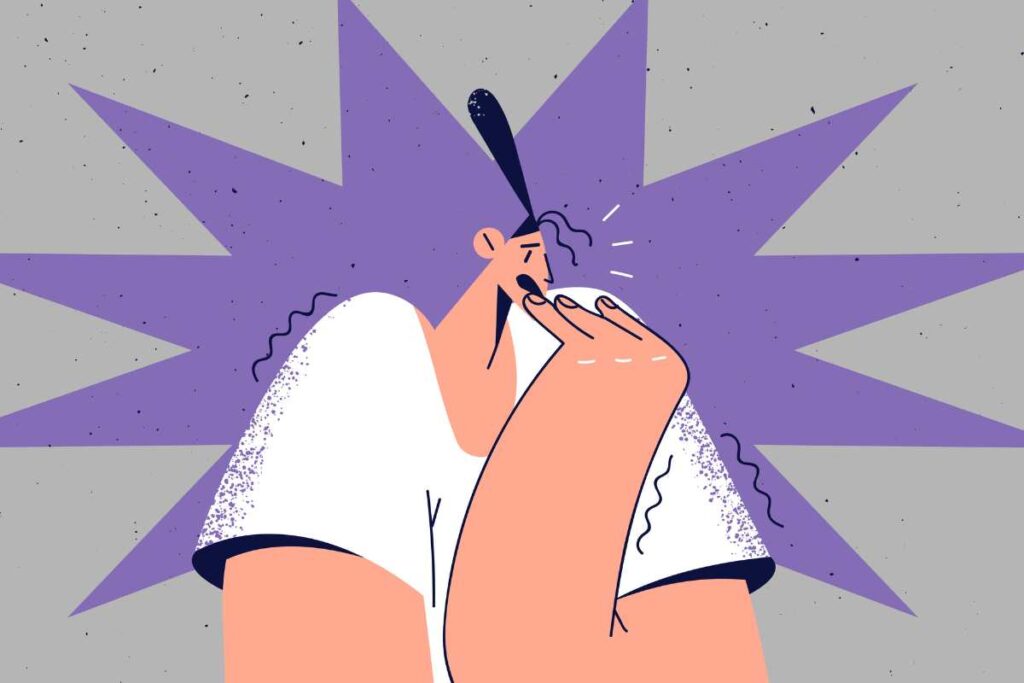Sometimes the most important thing in a whole day is the
rest
taken between two deep breaths.~ Etty Hillesum
Are you feeling anxious? Is your sense of unease increased as you go through the menopause journey? You are not alone, and in fact, your anxiety may be worse if you’ve never had it before. Anxiety is connected to the hormonal transition as well as some of the other symptoms you may experience during this journey. As Etty Hillesum said, take two deep breaths, and focus on the rest between those breaths. While you may have anxiety triggered by the menopause journey or vice versa, there are several treatment options available. You can tap into relaxation techniques, lifestyle habits, herbs, supplements, and medication to find the best option(s) for you.
Menopause anxiety
How are your anxiety levels? This is one of the menopausal symptoms that can last a long time!
Anxiety can begin as early as 10 years before menopause and last more than 10 years after its onset.
But you’re not alone. 25% of menopausal women+ suffer from anxiety.
Here are some things to keep in mind about your menopausal anxiety:
Your risk of experiencing it increases as you go through the journey.
This is true even if you’ve only ever experienced low levels of anxiety before. Anxiety can disrupt your quality of life even when you’re post-menopausal.
Anxiety can cause menopausal symptoms and vice versa.
It can be difficult to identify the root cause(s) or which came first. Learn about the interconnectedness.
If you have more severe menopausal symptoms, your anxiety tends to be worse.

17 anxiety treatment options
Your menopause journey is unique to you. So, there is no one-size-fits-all approach to menopausal anxiety treatment. What works for you may not work for a friend.
Below are 17 techniques to help manage your worries and fears.
Non-hormonal relaxation techniques
- Cognitive behavioral therapy (CBT)
- Emotional freedom technique (EFT), also known as tapping
- Acupuncture
- A gratitude practice
- Massage
- Mindfulness
- Yoga
Lifestyle
8. Move more.
9. Limit caffeine.
10. Limit alcohol.
11. Get enough good-quality sleep.
12. Practice self-care.
Herbal Medicine, Supplements, and Medication
13. Ashwagandha
14. Supplements
15. Hormone therapy (HT)
16. Anxiety medications
17. Check your current medications.
Let’s look at each one more thoroughly.
Non-hormonal relaxation techniques
1. Cognitive behavioral therapy (CBT)
Ever heard of cognitive behavioral therapy or CBT?
CBT is a therapeutic technique that helps you reframe your thoughts while also exposing you to your fears so you can manage rather than avoid situations that make you anxious.
CBT is often considered the gold standard for the treatment of anxiety disorders, especially over the longer term.
It can provide a greater sense of control and improve your quality of life. It can also be tailored to your specific anxiety disorder, of which there are many.
And an added bonus is that CBT can also help address menopausal symptoms, which is important because some of these (e.g., hot flashes, not getting enough sleep) can trigger or exacerbate anxiety.
pausitive health examined how CBT can work to change your thinking patterns about sleep, insomnia, and hot flashes/night sweats.
By using CBT, you can holistically improve your well-being.
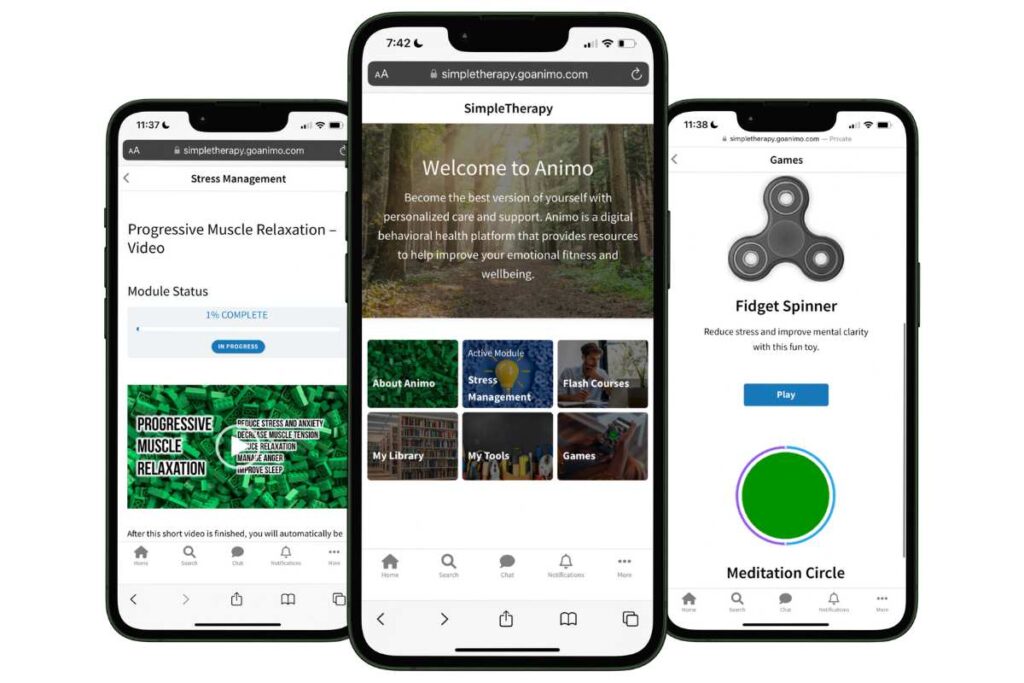
Free Digital CBT (d-CBT)
Only available for a limited time!
Become a member of the pausitive health pilot program and get access to complimentary digital cognitive behavioral therapy (d-CBT) from our collaboration partner, SimpleTherapy. These sessions can relieve anxiety, stress, and depressive symptoms.
As a member, you’ll also get access to personalized text messages that focus on topics you select, virtual care, a supportive community, and more!
Note that CBT experienced digitally vs. in-person may be different. However, studies show both approaches to be equally effective.
You can find therapists through the Academy of Cognitive and Behavioral Therapies.
The good news? It may only take a few sessions to see improvement.
2. Emotional Freedom Technique (EFT)
CBT lays a strong foundation for the emotional freedom technique (aka tapping) which can also help with anxiety.
EFT combines cognitive behavioral therapy, exposure therapy (a form of CBT), and stimulating acupressure points on the face and body.
You say a series of statements while tapping on your body.
For example, “I am feeling anxious during my menopause journey, but I accept how I feel and accept myself.
You repeat this throughout your tapping of the acupressure points.
You can change the symptom you’re feeling, using the pattern of symptom/problem/issue that’s bothering you followed by acceptance.
CBT takes a few sessions to see results. With tapping, results can be felt within minutes in an acute situation.
You can access tapping sessions with these apps:
3. Acupuncture
Acupuncture has long been used in Traditional Chinese Medicine (TCM) for a number of health conditions and ailments. It’s been shown to help improve menopausal symptoms, including anxiety.
How does it work for anxiety? According to the American Institute of Alternative Medicine, acupuncture increases happy hormones – endorphins, serotonin, and dopamine – and controls the release of the stress hormone cortisol.
According to the Institute, some of the acupuncture anxiety points are:
- on the highest point of the head
- middle of the forehead
- eyebrows
- wrist
- near the wrist crease
- base of the thumb and index finger
- top of the foot between the first and second toes
The menopause journey is a great time in your life to try something new and work toward making a change for the better! Using acupuncture can also help improve other menopausal symptoms like hot flashes and insomnia, which can trigger or make anxiety worse.
4. Gratitude
Gratitude is another non-hormonal way to manage anxiety, and it can be done in the comfort of your home for free!
Gratitude works for several menopausal symptoms, including anxiety, because it helps you find optimism and reflect on the positive aspects of life.
You feel these positive feelings because gratitude also positively impacts your brain! Many menopausal symptoms are due to changes in your brain and not your ovaries. We’re talking about you hot flashes, depression, and rage!
By changing your outlook, you can re-wire your brain to manage fear and worry so it doesn’t always turn into anxiety and stress.
In an analysis of sixty-four randomized clinical trials, gratitude reduced symptoms of both anxiety and depression.
Gratitude can start as a once-a-day practice. Over time, you’ll find ways to incorporate it into your life, so it becomes a way of being.
5. Massage
Massage is another relaxation technique that works. It can lower the levels of cortisol (stress hormone) in your body and release serotonin (a “happy” chemical). The combination can help you combat anxiety.
Massage boosts how you feel, both physically and mentally. Think of how relaxed you are after a massage.
It can also help with the aches and pains which can be associated with the menopause journey. This is also known as the musculoskeletal syndrome of menopause (MSM), experienced by up to 70% of women.
6. Mindfulness
When you’re in a mindful mental state, you’re nonjudgmental and live in the present moment. You’re focused on how you feel, what you hear, and your thoughts, and you face the present moment with openness, curiosity, and acceptance.
When you practice mindfulness, you can stop reflexively negative reactions and view situations more objectively.
PositivePsychology has a number of mindfulness scripts, worksheets, and mantras. For example, the FLARE for Anxiety and Fear worksheet helps you accept anxiety rather than fight it.
Mindfulness can also be used to reduce other menopausal symptoms like stress, hot flashes, and sleep issues. It can also aid in resetting a negative mindset, and reducing the likelihood of developing chronic conditions for which you may be at increased risk due to the hormonal changes which occur during the menopause journey.
Learn how to experience a mindful menopause so you can feel more grounded and ready to roll with what life may bring.
Practice breathing
Our Mindfulness Mentor, Skylar Griessel, showed women+ how to use the 4-7-8 breathing technique (a form of mindfulness) to help with panic attacks and anxiety during a webinar. This intentional practice focuses on counting your breath. In turn, you re-focus your mind on something other than what’s causing anxiety or a panic attack.
Here’s how this breathing technique works:
- 4 seconds – Inhale through your nose slowly.
- 7 seconds – Hold your breath.
- 8 seconds – Slowly exhale through your mouth.
Watch the pausitive health webinar, and practice this technique with our Mindfulness Mentor. Listen at 24:40.
7. Yoga
Yoga, by itself, can also help with anxiety or you can incorporate it into a mindfulness practice.
A study by researchers at NYU Grossman School of Medicine found yoga was more effective than stress management education but not as effective as CBT for generalized anxiety disorder (GAD).
In the study, men and women were assigned to 3 groups – CBT, Kundalini yoga, or stress management education.
54% of those who participated in yoga saw anxiety symptoms improve, whereas 71% of CBT participants saw improvement.
Other types of yoga have also shown effectiveness, including hatha yoga.
Yoga can also help improve other menopausal symptoms. Learn about the different types of yoga and some “meno-poses” that can help menopausal symptoms.
Lifestyle
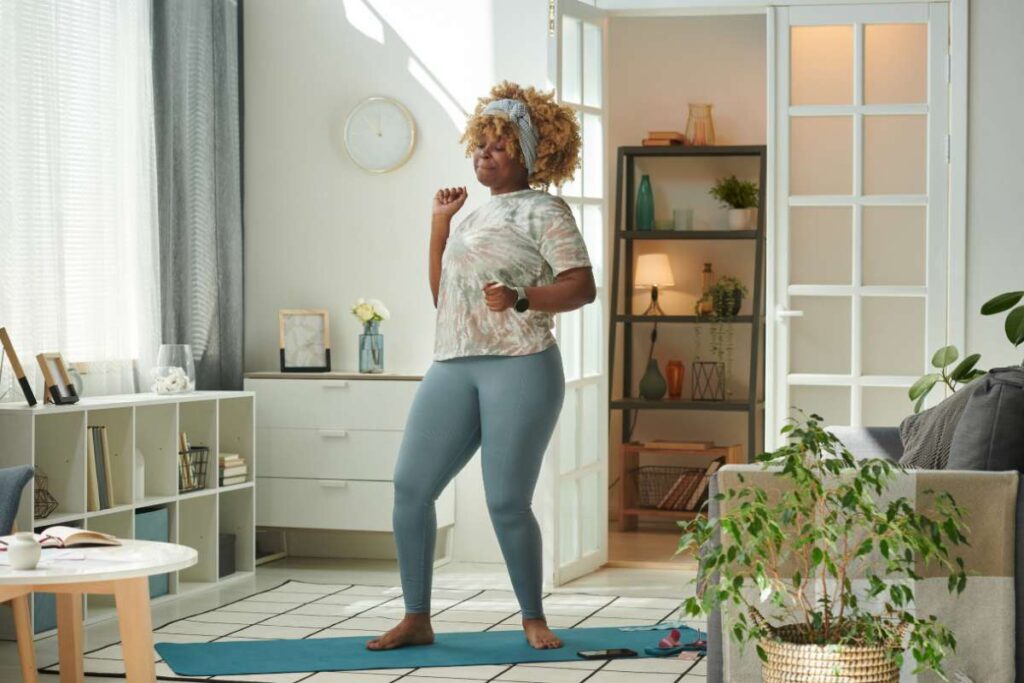
8. Move your body
Sometimes the best thing you can do to take the edge off your anxiety is to move your body. It can:
- release the jittery feelings
- break the circuit of rapid breathing
- distract from your sense of impending doom or free-floating uneasiness
Many people get an extra boost if they are able to move while out in nature. So that means, moving your body can be as simple as mindful walking or some basic dance moves.
9. Limit caffeine
When you drink or eat foods with caffeine, do you ever feel jittery? It may be best known for a jolt of energy in the morning, but caffeine can increase your heart rate and cause you to feel jittery, restless, and nervous. These symptoms can come and go.
You may even experience caffeine-induced anxiety.
So, limiting caffeine intake can help improve your anxiety. This includes:
- coffee
- tea
- some sodas (e.g., cola, Mountain Dew)
- chocolate
If you’d like to decrease the amount of caffeine you consume, you should do so gradually to avoid withdrawal symptoms like headaches, fatigue, and irritability.
Abruptly decreasing your caffeine intake can also worsen your anxiety symptoms.
10. Avoid alcohol
Even though some people drink alcohol to relax, alcohol can actually cause anxiety.
It may also trigger anxiety by disrupting your sleep and worsening your menopausal symptoms, including hot flashes and weight gain.
So, avoiding alcohol may help you feel better.
Anxiety levels can increase up to 30%
after a sleepless night.
Source: UC Berkeley Research
11. Get enough good-quality sleep
Don’t underestimate the power of a good night’s sleep!
Sleep can make all the difference in how you feel. But, getting enough sleep, especially during the menopause journey, can be difficult.
Hormonal fluctuations can disrupt sleep, either on their own or related to hot flashes and night sweats.
So, it’s important to find ways to improve your sleep during the hormonal transition because not getting enough can cause a snowball effect on other menopausal symptoms that are already challenging, like weight gain. If you aren’t sleeping well, you may become fatigued and therefore exercise less; or you find yourself with cravings for unhealthy comfort foods. Insufficient sleep can also lead to being more stressed and anxious.
UC Berkeley researchers found sleep is likely under-utilized as a clinical treatment option for anxiety. But brain scans showed after a night of no sleep, the area of the brain that keeps anxiety in check essentially shuts down. As a result, anxiety levels increased up to 30%.
However, if you get enough deep sleep, you can actually decrease anxiety overnight! It’s known as non-rapid eye movement (NREM) slow-wave sleep.
During this part of the sleep cycle, your eye movements stop, and your breathing, brain activity, and heart rate slow.
So, how do you get into a deeper sleep pattern? Kick your sleep hygiene (yes, it’s a thing) into high gear!
And layer your routine with techniques that calm the mind and body during the day so you can stay relaxed and asleep at night.
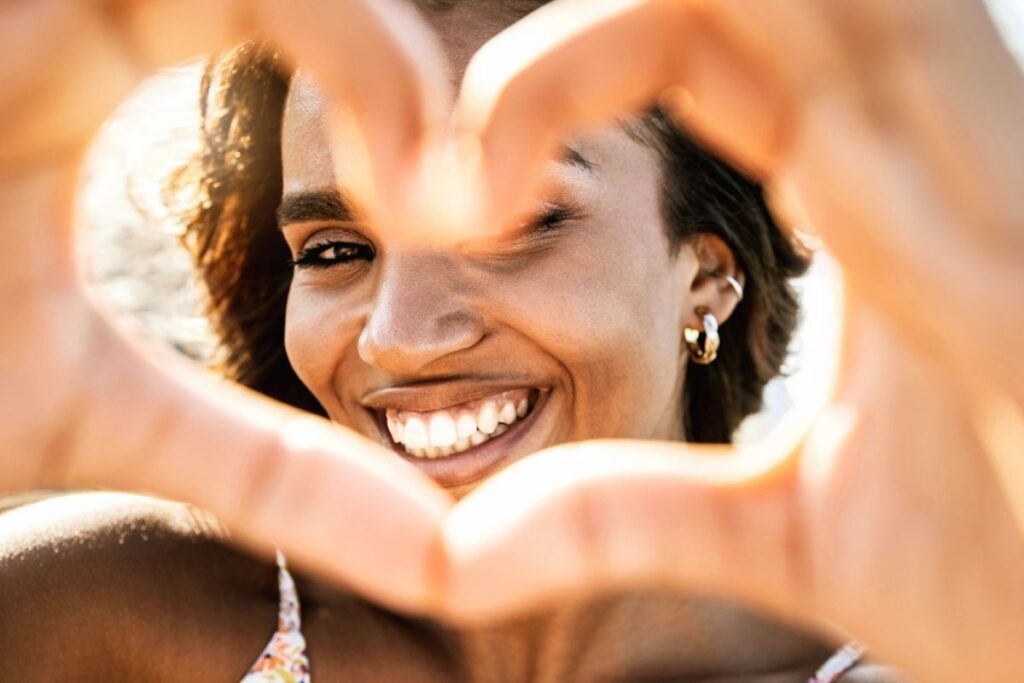
12. Practice self-care
As part of a healthy lifestyle, develop a self-care routine. There is no better time than the present (during the menopause journey) to take time for you!
Self-care can ease your mind of stress and anxiety, and help you create better coping strategies than using alcohol to relax.
While many people think of massages (which can reduce anxiety) and baths when it comes to self-care, there’s so much more to it. Focus on your mind, body, and spirit.
One of the biggest challenges with self-care is finding time for it. That may take a mindset shift, if you’re not already prioritizing yourself. It’s one of the best ways to holistically improve your health and well-being.
Ready to show yourself some love? Our pausitive guide details self-care strategies with science-backed benefits for stress and anxiety.
Herbal Medicine, Supplements, and Medications
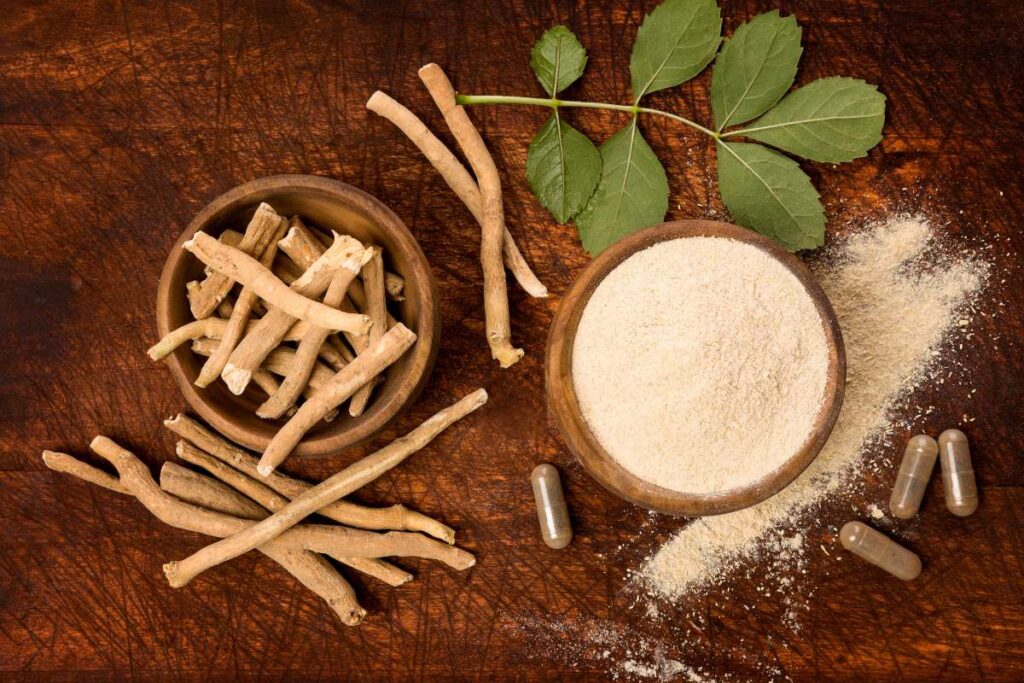
13. Investigate ashwagandha for menopausal symptoms and anxiety
Ashwagandha is a type of shrub that has been used in medicine for thousands of years. It contains withanolides, which have anti-inflammatory and antioxidant effects.
But more notably, ashwagandha has been shown to help improve anxiety, stress, and sleep.
It’s also been shown to improve menopausal symptoms, like hot flashes, night sweats, mood changes, and vaginal dryness.
As always, before beginning this herbal approach speak with your healthcare provider to determine if there are any potential negative interactions with medications or OTC/supplement products you may be taking, or if you have underlying conditions or other reasons why ashwagandha may not be safe in your particular situation.
You can learn more about herbal medicine from one of pausitive health’s expert guest contributors, clinical herbalist Kay Sidahmed PhD, MS, who discusses herbal medicine and how it can be used to address symptoms like brain fog, sleep issues, volatile emotions and weight management during a pausitive health webinar.
14. Over-the-counter supplements
There are many supplements that can potentially help your menopausal symptoms. Decreasing those symptoms may help your anxiety.
You can also take magnesium for anxiety and heart palpitations. About 1 in 3 people have low magnesium levels. Magnesium decreases your stress hormones, which cause anxiety. It also helps your heart pump.
Medical conditions that affect your intestines, bones, and kidneys can increase your risk of having low magnesium levels. Certain medications can do this as well, like:
- Calcium supplements
- Diuretics (“water pills”)
- Proton pump inhibitors (PPIs), like omeprazole and pantoprazole for GI reflux
- Certain types of chemotherapy
Speak with your healthcare provider about your magnesium level. Magnesium can also help with restless leg syndrome, which can impact women+ on the menopause journey and make deep sleep more difficult.
If your magnesium levels are low, a supplement or higher magnesium diet might be right for you.
Other nutrient deficiencies also associated with anxiety include vitamin B, vitamin C, and zinc.
If you’re a pausitive health member, don’t forget the clinically-validated diet assessment available through our collaboration partner, DietID, includes a check for potential nutrient deficiencies and dietary recommendations to address them!
Not a member? Join us!
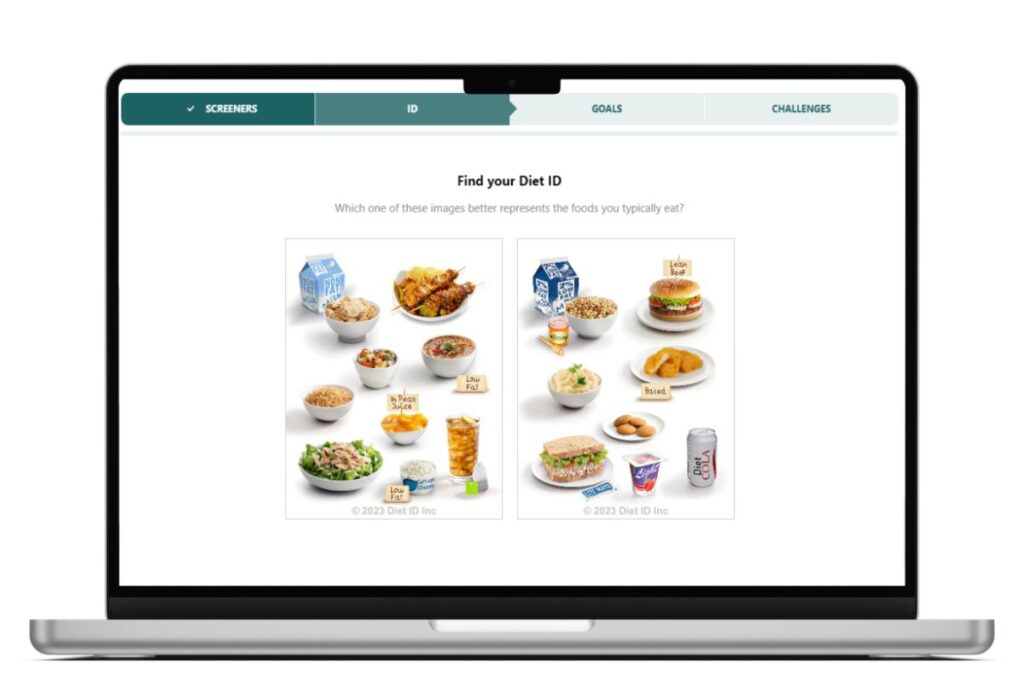
Free Menopause Diet Assessment
Only available for a limited time!
Become a pausitive health pilot member and access a clinically-validated dietary assessment focusing on food quality and the identification of potential nutritional deficiencies. Get recommended dietary patterns and recipes to optimize your health and well-being.
As a member, one-stop menopause solution that provides personalized text messages that focus on topics you select and provides access to lifestyle tools, virtual care, webinars, partner offers, and a supportive community.
15. Hormone Therapy (HT)
HT is the gold standard for treating many menopausal symptoms, but it is not for everyone. And when it comes to anxiety, studies are mixed on whether it helps.
- Some research has shown no improvement in anxiety symptoms.
- Other data have shown it helps in perimenopausal women+ but not postmenopausal women+.
- Yet, others even show mild increases in anxiety symptoms.
It’s difficult to conclude who may benefit. So, speak with your doctor if you’re interested in exploring if/how HT may help you.
And remember, it should not be prescribed with a one-size-fits all approach. The latest HT guidance recommends doctors individualize the treatment.
In this pausitive health webinar, guest contributor Dr. Taniqua Miller, FACOG, MSCP, Founder of Revival Telemedicine, provides insights into menopausal hormone therapy (MHT).
16. Check your medications
Some medications can cause anxiety symptoms. These include:
- Steroids, like prednisone and dexamethasone
- Allergy and cold medications, like certain antihistamines and decongestants
- Some antidepressants, like Prozac and Zoloft
- Thyroid medications, like levothyroxine and liothyronine
- Certain types of rescue inhalers for asthma or COPD
- Stimulants, like those used for ADHD
Speak with your pharmacist or healthcare provider to learn if any of your medications may be contributing to your anxiety symptoms.
They may recommend lowering your dosage or stopping a medication.
17. Prescription anti-anxiety medications
Speak with your healthcare provider to learn more about additional treatment options, including prescription anti-anxiety medications, if needed.
Some of these include:
- SSRIs (Paxil, Zoloft, Celexa, Lexapro, Prozac)
- SNRIs (Cymbalta, Effexor XR)
- TCAs (Elavil, Pamelor)
- Benzodiazepines (Valium, Xanax)
- Beta Blockers (Inderal)
If you want to explore some of these types of medications, this 2020 research details many of the common medications used to treat anxiety.
Some of these medications may also help ease other menopausal symptoms like depression or hot flashes, when prescribed “off-label” (used for a reason other than the one for which the medication was approved by the FDA).
Have a discussion with your doctor, as the type of medication recommended may depend on the type of anxiety you have and other personal health considerations.
Call 9-8-8
You have options
Always remember, you have options during the menopause journey, and pausitive health is here to help you!
You don’t have to just live with your anxiety. You can feel better. And you can do it in a way that fits your goals and your unique menopause journey.
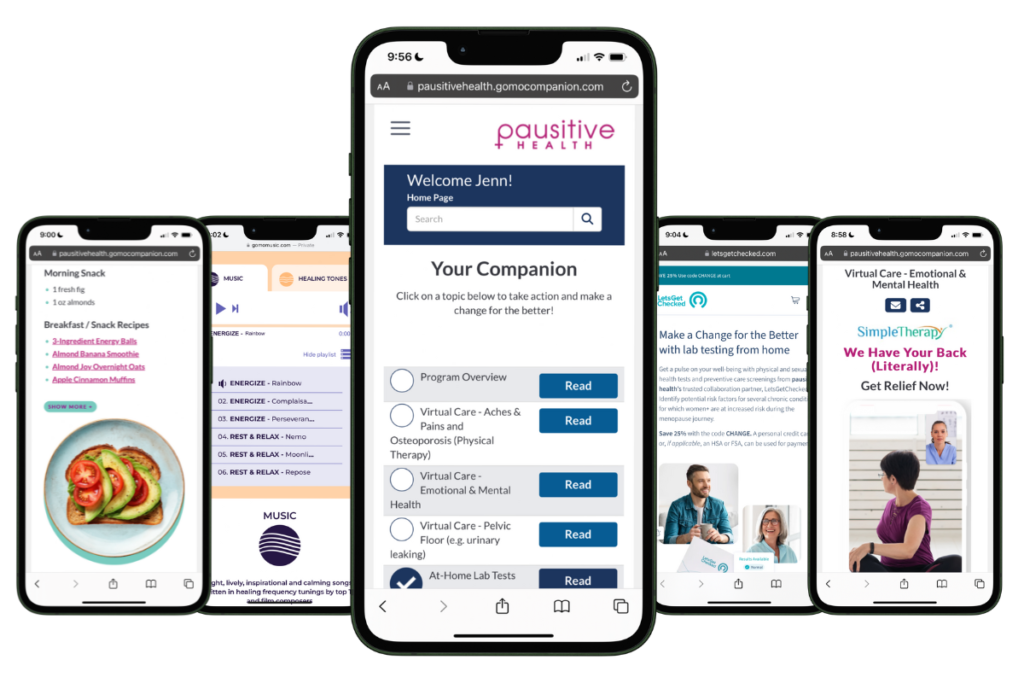
Free Support
For A Limited Time!
pausitive health offers personalized support for every stage of the menopause journey. Customize your experience with 14 evidence-based educational tracks, a diet assessment with recommendations and a food library, solutions for aches and pains, virtual care options, practical lifestyle supports, and a supportive community. All in one trusted place.
Join the pilot and be the first to know when our web-app is coming in 2026!
Hart J. Menopause: Shifting Hormones Linked to Anxiety and Depression Symptoms. Alternative and Complementary Therapies. 2019. Vol 25, No. 5. doi: 10.1089/act.2019.29241.jha
Huang S, Wang Z, Zheng D, Liu L. Anxiety disorder in menopausal women and the intervention efficacy of mindfulness-based stress reduction. Am J Transl Res. 2023 Mar 15;15(3):2016-2024. PMID: 37056841; PMCID: PMC10086901.
Zandieh S, Abdollahzadeh SM, Sadeghirad B, Wang L, McCabe RE, Yao L, Inness BE, Pathak A, Couban RJ, Crandon H, Torabiardakani K, Bieling P, Busse JW. Therapist-guided remote versus in-person cognitive behavioural therapy: a systematic review and meta-analysis of randomized controlled trials. CMAJ. 2024 Mar 17;196(10):E327-E340. doi: 10.1503/cmaj.230274. Erratum in: CMAJ. 2024 Apr 14;196(14):E488. doi: 10.1503/cmaj.240432. PMID: 38499303; PMCID: PMC10948182.
Find a Therapist | Academy of Cognitive and Behavioral Therapies
Home | Libbie Health
The Future of Mental Wellness Has Arrived | The Tapping Solution
Acupuncture for Anxiety: Benefits, Points, and Cost | American Institute of Alternative Medicine
Diniz G, Korkes L, Tristão LS, Pelegrini R, Bellodi PL, Bernardo WM. The effects of gratitude interventions: a systematic review and meta-analysis. Einstein (Sao Paulo). 2023 Aug 11;21:eRW0371. doi: 10.31744/einstein_journal/2023RW0371. PMID: 37585888; PMCID: PMC10393216.
Can massage relieve symptoms of depression, anxiety, and stress? | Mayo Clinic Health System
How to Use Mindfulness Therapy for Anxiety: 15 Exercises | Positive Psychology
FLARE for Anxiety and Fear | Positive Psychology
Shohani M, Badfar G, Nasirkandy MP, Kaikhavani S, Rahmati S, Modmeli Y, Soleymani A, Azami M. The Effect of Yoga on Stress, Anxiety, and Depression in Women. Int J Prev Med. 2018 Feb 21;9:21. doi: 10.4103/ijpvm.IJPVM_242_16. PMID: 29541436; PMCID: PMC5843960.
A Guided Walking Meditation for Daily Life | Mindful
Does Caffeine Cause Anxiety? | Healthline Media
Spilling the Beans: How Much Caffeine is Too Much? | U.S. Food and Drug Administration
Stressed to the max? Deep sleep can rewire the anxious brain | UC Regents
Speers AB, Cabey KA, Soumyanath A, Wright KM. Effects of Withania somnifera (Ashwagandha) on Stress and the Stress- Related Neuropsychiatric Disorders Anxiety, Depression, and Insomnia. Curr Neuropharmacol. 2021;19(9):1468-1495. doi: 10.2174/1570159X19666210712151556. PMID: 34254920; PMCID: PMC8762185.
DiNicolantonio JJ, O’Keefe JH, Wilson W. Subclinical magnesium deficiency: a principal driver of cardiovascular disease and a public health crisis. Open Heart. 2018 Jan 13;5(1):e000668. doi: 10.1136/openhrt-2017-000668. Erratum in: Open Heart. 2018 Apr 5;5(1):e000668corr1. doi: 10.1136/openhrt-2017-000668corr1. PMID: 29387426; PMCID: PMC5786912.
Florentin M, Elisaf MS. Proton pump inhibitor-induced hypomagnesemia: A new challenge. World J Nephrol. 2012 Dec 6;1(6):151-4. doi: 10.5527/wjn.v1.i6.151. PMID: 24175253; PMCID: PMC3782221.
Kris-Etherton PM, Petersen KS, Hibbeln JR, Hurley D, Kolick V, Peoples S, Rodriguez N, Woodward-Lopez G. Nutrition and behavioral health disorders: depression and anxiety. Nutr Rev. 2021 Feb 11;79(3):247-260. doi: 10.1093/nutrit/nuaa025. PMID: 32447382; PMCID: PMC8453603.
J. Wang, Y. Liao, Y. You, W. Liang, L. Wan, H. Yang, J. Liu, Y. Li, X. Wang & G. Nie. (2023) Acupuncture and Chinese herbal medicine for menopausal mood disorder: a randomized controlled trial. Climacteric 26:4, pages 392-400.
Bremer E. Anxiety in Menopause: A Qualitative Inquiry. 2018. Dissertation Virginia Commonwealth University.
Home | Revival Telemedicine
SSRIs and Benzodiazepines for General Anxiety Disorder (GAD) | Anxiety & Depression Association of America
Garakani A, Murrough JW, Freire RC, Thom RP, Larkin K, Buono FD, Iosifescu DV. Pharmacotherapy of Anxiety Disorders: Current and Emerging Treatment Options. Front Psychiatry. 2020 Dec 23;11:595584. doi: 10.3389/fpsyt.2020.595584. PMID: 33424664; PMCID: PMC7786299.
You may also like…

Power Through Menopausal Changes with this RAIN Mindfulness Technique
The RAIN mindfulness technique can help you power through menopausal changes with a positive mindset. Read or listen to this script.
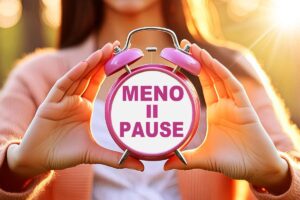
Missing Your Life Before Menopause? How to Manage The Grief and Loss
Do you ever think about life before menopausal symptoms? If you feel a sense of loss or grief, try these emotional coping strategies.
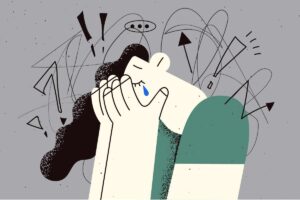
Feeling Anxious? How Anxiety Impacts Menopausal Symptoms and Vice Versa
Are you feeling more anxious during the menopause journey? You are not alone. Learn how it can impact other menopause symptoms too.

